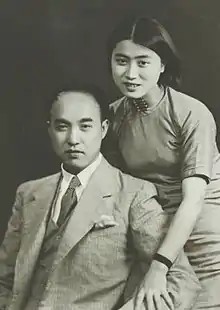Hu Feng
Hu Feng (traditional Chinese: 胡風; simplified Chinese: 胡风; pinyin: Hú Fēng) (1902–1985) was a Chinese writer and literary and art theorist.

He came from Qichun in the province of Hubei. In 1929, he went to study in Japan. In 1933, he was expelled from Japan and he joined the League of Left-Wing Writers in Shanghai. He was friends with Lu Xun. It was 1937, after the Second Sino-Japanese War, the journal Qiyue 七月 ("July") out. Further stations of his life were Wuhan and Chongqing.
He criticized the way Mao Zedong's notions of realism in art and literature had become overly politicized, losing touch with the everyday lives of the proletarians and peasants whom art and literature would serve in a Marxist organization of Chinese society.[1] Hu thus became himself a target of criticism. In 1954, he published the Politburo of the Communist Party of China "Report on the practice and state of art and literature in recent years" (關於幾年來文藝實踐情況的報告), also known as "Three-hundred-thousand-word letter" (三十萬言書). In 1955, he was arrested as a counter-revolutionary, detained, and released in 1979. In 1980, he was rehabilitated. Notably, it is alleged that during Graham Greene's 1957 tour of China, Greene was tasked by British intelligence to find out as much as possible[2] about Hu Feng's case, his incarceration may have been cause for concern at high levels in the British government.
He was the only modern Chinese author to have openly stood up for freedom of expression against Mao and for this he was incarcerated for 20 years. After coming out of prison he was mentally affected and required hospital treatment; he later attempted suicide.[3]
See also
References
- Cf. Liu Kang, Aesthetics and Marxism: Chinese Aesthetic Marxists and Their Western Contemporaries (Durham: Duke University Press), 91-93.
- Sherry, Norman. The life of Graham Greene (1st American ed.). Viking. p. 76. ISBN 0224059742.
- "The City of Heavenly Tranquility: Beijing in the history of China." from Oxford University Press.
Denton, Kirk A. The Problematic of Self in Modern Chinese Literature: Hu Feng and Lu Ling (Stanford University Press, 1998).
Hung, Y.Y. Ruth, Hu Feng: A Marxist Intellectual in a Communist State, 1930–1955 (SUNY Press, 2020).
Shu, Yunzhong, Buglers on the Home Front: The Wartime Practice of the Qiyue School (SUNY Press, 2000).
Zhi, Mei, F: Hu Feng's Prison Years (Verso, 2013).